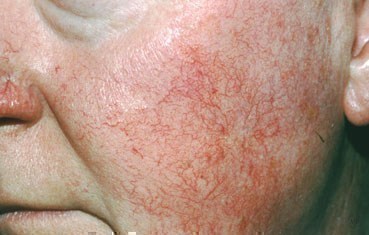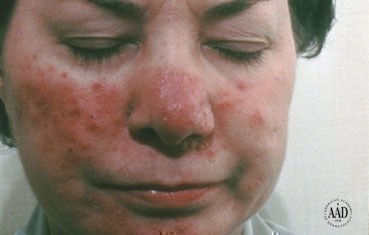Schedule a dermatology appointment?
Rosacea
Rosacea is known for causing redness and visible blood vessels in your face, with flare-ups that can last for weeks or months at a time. If 
Rosacea Q & A
What causes rosacea?
The cause isn’t well understood, although medical experts find that a combination of genetics and environmental triggers tend to exacerbate the problem. You’re more likely to experience flare-ups due to:
- Drinking alcohol
- Vigorous exercise
- Prescriptions that dilate blood vessels
- Consuming hot drinks or spicy foods
- Exposure to extreme hot or cold temperatures
In some cases, rosacea occurs because your skin doesn’t tolerate your soap, shampoo, face wash, or makeup. This is why it’s particularly important for rosacea sufferers to use products that are clinically designed for sensitive skin.
Rosacea Symptoms
It most commonly develops on your face, particularly in the central part around your nose. Symptoms include:
- Facial redness
- Enlarged nose
- Visible blood vessels or capillaries
- Swollen red bumps that may contain pus
- Eye irritation, dryness, or swelling
It’s also common for your skin to feel hot and tender when you’re having a flare-up. The only way to know for certain if you have rosacea is to have a thorough exam and diagnosis.
While there isn’t a single rosacea test to diagnose the condition, we sometimes orders laboratory testing to rule out other chronic 
Is there a cure for rosacea?
While no cure exists for rosacea, this chronic skin condition is certainly manageable with the help of our skin experts. Your customized treatment plan may include:
- Medication to reduce redness
- Oral acne medications or antibiotics
- Laser light therapy treatments (phototherapy)
If you don’t already, it’s also important to protect your face and wear a broad-spectrum sunscreen every day, since sun exposure can worsen rosacea. Our team will spend time working with you on which triggers and how to avoid or minimize them, including any lifestyle changes you could make to prevent future flare-ups and recommending skincare products which can help calm flare-ups.
